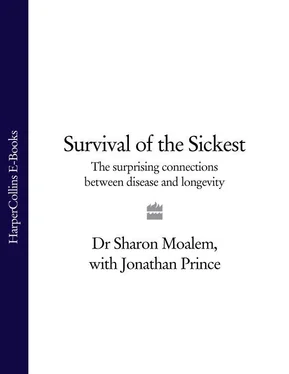THE SURPRISING CONNECTIONS BETWEEN
DISEASE AND LONGEVITY
DR. SHARON MOALEM
with Jonathan Prince

DEDICATION Dedication Introduction Chapter One : Ironing It Out Chapter Two : A Spoonful of Sugar Helps the Temperature Go Down Chapter Three : The Cholesterol Also Rises Chapter Four : Hey, Bud, Can You Do Me a Fava? Chapter Five : Of Microbes and Men Chapter Six : Jump into the Gene Pool Chapter Seven : Methyl Madness: Road to the Final Phenotype Chapter Eight : That’s Life: Why You and Your iPod Must Die Index Acknowledgments About the Author Notes Copyright About the Publisher
To my grandparents Tibi and Josephina Elizabeth Weiss, whose lives served to teach me the complexities of survival
Cover
Title Page SURVIVAL OF THE SICKEST THE SURPRISING CONNECTIONS BETWEEN DISEASE AND LONGEVITY DR. SHARON MOALEM with Jonathan Prince
Dedication DEDICATION Dedication Introduction Chapter One : Ironing It Out Chapter Two : A Spoonful of Sugar Helps the Temperature Go Down Chapter Three : The Cholesterol Also Rises Chapter Four : Hey, Bud, Can You Do Me a Fava? Chapter Five : Of Microbes and Men Chapter Six : Jump into the Gene Pool Chapter Seven : Methyl Madness: Road to the Final Phenotype Chapter Eight : That’s Life: Why You and Your iPod Must Die Index Acknowledgments About the Author Notes Copyright About the Publisher To my grandparents Tibi and Josephina Elizabeth Weiss, whose lives served to teach me the complexities of survival
Introduction
Chapter One: Ironing It Out
Chapter Two: A Spoonful of Sugar Helps the Temperature Go Down
Chapter Three: The Cholesterol Also Rises
Chapter Four: Hey, Bud, Can You Do Me a Fava?
Chapter Five: Of Microbes and Men
Chapter Six: Jump into the Gene Pool
Chapter Seven: Methyl Madness: Road to the Final Phenotype
Chapter Eight: That’s Life: Why You and Your iPod Must Die
Index
Acknowledgments
About the Author
Notes
Copyright
About the Publisher
This is a book about mysteries and miracles. About medicine and myth. About cold iron, red blood, and neverending ice. It’s a book about survival and creation. It’s a book that wonders why, and a book that asks why not. It’s a book in love with order and a book that craves a little chaos.
Most of all, it’s a book about life – yours, ours, and that of every little living thing under the sun. About how we all got here, where we’re all going, and what we can do about it.
Welcome to our magical medical mystery tour.
When I was fifteen years old, my grandfather was diagnosed with Alzheimer’s disease. He was seventy-one. Alzheimer’s – as too many people know – is a terrible disease to watch. And when you’re fifteen, watching a strong, loving man drift away almost before your eyes, it’s hard to accept. You want answers. You want to know why.
Now, there was one thing about my grandfather that always struck me as kind of strange – he loved to give blood. And I mean he loved it. He loved the way it made him feel; he loved the way it energized him. Most people donate blood purely because it makes them feel good emotionally to do something altruistic – not my grandfather; it made him feel good both emotionally and physically. He said no matter where his body hurt, all he needed was a good bleeding to make the aches and pains go away. I couldn’t understand how giving away a pint of the stuff our lives depend on could make someone feel so good. I asked my high school biology teachers. I asked the family doctor. Nobody could explain it. So I felt it was up to me to figure it out.
I convinced my father to take me to a medical library, where I spent countless hours searching for an answer. I don’t know how I possibly found it among the thousands and thousands of books in the library, but something steered me there. In a hunch, I decided to plow through all the books about iron – I knew enough to know that iron was one of the big things my grandfather was giving up every time he donated blood. And then – bam! There it was – a relatively unheard of hereditary condition called hemochromatosis. Basically, hemochromatosis is a disorder that causes iron to build up in the body. Eventually, the iron can build up to dangerous levels, where it damages organs like the pancreas and the liver; that’s why it’s also called “iron overload.” Sometimes, some of that excess iron is deposited in the skin, giving you a George Hamilton perma-tan all year long. And as we’ll explore, giving blood is the best way to reduce the iron levels in your body – all my grand-father’s blood donations were actually treating his hemochromatosis!
Well, when my grandfather was diagnosed with Alzheimer’s, I had a gut instinct that the two diseases had to be connected. After all, if hemochromatosis caused dangerous iron buildups that damaged other organs, why couldn’t it contribute to damage in the brain? Of course, nobody took me very seriously – I was fifteen.
When I went to college a few years later, there was no question that I was going to study biology. And there was no question that I was going to keep on searching for the link between Alzheimer’s and hemochromatosis. Soon after I graduated, I learned that the gene for hemochromatosis had been pinpointed; I knew that this was the right time to pursue my hunch seriously. I delayed medical school to enter a Ph.D. program focused on neurogenetics. After just two years of collaborative work with researchers and physicians from many different laboratories we had our answer. It was a complex genetic association, but sure enough there was indeed a link between hemochromatosis and certain types of Alzheimer’s disease.
It was a bittersweet victory, though. I had proved my high school hunch (and even earned a Ph.D. for it), but it did nothing for my grandfather. He had died twelve years earlier, at seventy-six, after five long years battling Alzheimer’s. Of course, I also knew that this discovery could help many others – and that’s why I wanted to be a physician and a scientist in the first place.
And actually, as we’ll discuss more in the next chapter, unlike many scientific discoveries, this one came with the potential for an immediate payoff. Hemochromatosis is one of the most common genetic disorders in people descended from Western Europeans: more than 30 percent carry these genes. And if you know you have hemochromatosis, there are some very straightforward steps you can take to reduce the iron levels in your blood and prevent the iron buildups that can damage your organs, including the one my grandfather discovered on his own – bleeding. And as for knowing whether or not you have hemochromatosis – well, there are a couple of very simple blood tests used to make the diagnosis. That’s about it. And if the results come back positive, then you start to give blood regularly and modify your diet. But you can live with it.
I do.
I was around eighteen when I first started feeling “achy.” And then it dawned on me – maybe I have iron overload like my grandfather. And sure enough, the tests came back positive. As you can imagine, that got me thinking – what did this mean for me? Why did I get it? And the biggest question of all – why would so many people inherit a gene for something potentially so harmful? Why would evolution – which is supposed to weed out harmful traits and promote helpful ones – allow this gene to persist?
Читать дальше













